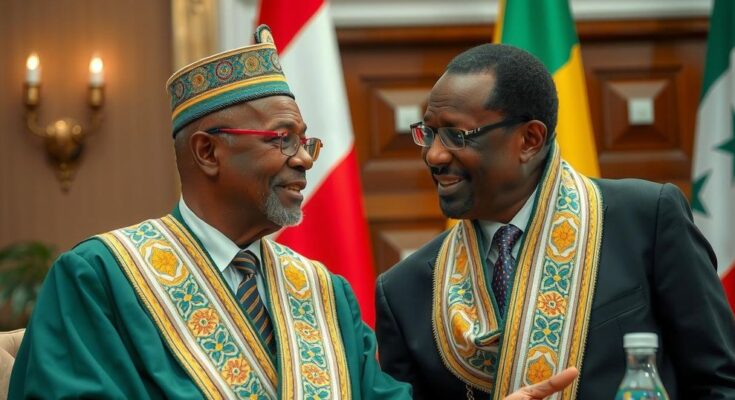General Assimi Goïta of Mali and Abdel Fattah al-Burhan of Sudan met to discuss military challenges in their countries, following shifts in power dynamics marked by coups and conflicts. Both leaders are strengthening ties with Russia amid distancing from France.
On Saturday, Mali’s ruling junta head, General Assimi Goïta, engaged in discussions with Sudan’s de facto leader, Abdel Fattah al-Burhan, as both nations navigate significant military challenges. Goïta, who came to power through a coup in 2020 that ousted President Ibrahim Boubacar Keïta, welcomed Burhan during his 48-hour visit, according to a statement from the Malian presidency on social media.
General Assimi Goïta’s ascent to power was mirrored by Burhan’s own rise, who, in 2021, dismissed civilian governance established post-Omar al-Bashir’s 2019 ousting. However, Sudan faces turmoil following Burhan’s deputy, General Mohamed Hamdan Daglo, also known as Hemedti, rebelling against him, resulting in a conflict with Burhan’s army and Hemedti’s Rapid Support Forces (RSF). The Malian presidency announced that the two leaders would engage in ‘numerous activities’ during Burhan’s visit, though specifics were not disclosed.
Since gaining power, Mali’s leadership has pursued a foreign policy that distances itself from its former colonial ruler, France, and tilts towards Russia and the Wagner Group, a paramilitary organization. Concurrently, Sudan has also fortified its connections with Russia; however, Moscow is currently reassessing its support for the RSF amid concerns over maintaining vital military bases in Syria. Notably, Guinea-Bissau has also confirmed Burhan’s visit, extending through Sunday and Monday, indicating a regional engagement amid ongoing military and political struggles.
The political environments in Mali and Sudan have been profoundly shaped by military coups and subsequent leadership dynamics. General Assimi Goïta took control in Mali during a period of political instability, reflecting a broader trend of military influence in governance across several nations in the region. Similarly, General Abdel Fattah al-Burhan’s rise in Sudan, which occurred after the overthrow of long-time dictator Omar al-Bashir, has also spawned significant conflict, particularly following the rebellion by his deputy, General Hemedti. The geopolitical alignments of both countries have shifted, with growing ties to Russia and a burgeoning distancing from Western powers, particularly France.
In summary, the meeting between Generals Goïta and Burhan underscores the intertwined military challenges both leaders face in their respective countries. The discussions signal an alignment of interests, particularly concerning their respective stands against foreign influences and the strengthening of ties with Russia. As both nations continue to grapple with internal discord, their interactions may influence regional power dynamics and international relations moving forward.
Original Source: newscentral.africa




